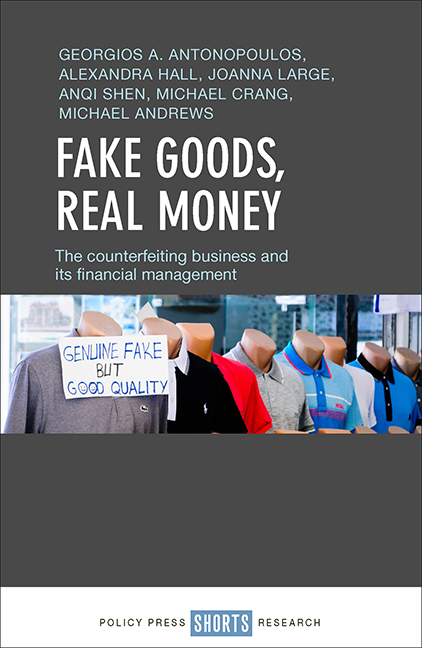Book contents
four - Financial aspects of the counterfeit goods market
Published online by Cambridge University Press: 12 April 2022
Summary
Capital to start and sustain a counterfeiting business
Once a prospective entrepreneur identifies an opportunity to begin supplying counterfeit goods, resources must be mobilised quickly to seize the opportunity. Start-up capital is required for someone to enter the counterfeiting business, cover the costs of establishing the business and operate it until some profit is generated. This initial amount depends largely on the product type and the quantity and quality of the merchandise being traded. There is a wide range of sources that can be drawn upon for the initiation of counterfeiting operations. The first, concerning small-scale schemes, can be small funds from legitimate work and savings. This category includes start-up money from social security benefits. This becomes possible because of the extremely low funds that are required for one to enter a counterfeiting scheme selling on a small scale to friends and acquaintances. Ironically, such schemes funded by social security are essentially state-subsidised. Small-scale start-up capital can also include funds from legitimate work and savings, which allows virtually anyone with a small amount of capital to become involved in the business, from holidaymakers to students and those working internationally. The case of ‘Dave’, the counterfeit TAG Heuer watch entrepreneur, is indicative here. The money invested in his scheme is personal money; savings from his legal work as a bartender from September to June. The amount invested in buying the counterfeit watches is about £900 per year (interview with criminal entrepreneur #4). In another case, we came across a young man living with his parents who operated a Facebook-based business delivering merchandise locally. He started the business by buying £200 worth of counterfeit merchandise from Bristol Fruit Market. The authorities estimated that he made a profit of £20,000 within six months (interview with investigator working in a private company).
Schemes are also funded with money from legal business. In this case, the actors are often owners of transportation/logistics companies or legitimate companies trading in the same commodity that is counterfeited (eg alcohol wholesalers trading in counterfeit alcohol). In cases where a scheme becomes successful, it can attract investment from others involved in the trade. Sometimes, the criminal entrepreneurs are presented with opportunities to expand and invite people from their wider social and (legal) business circles to join the scheme.
- Type
- Chapter
- Information
- Fake Goods, Real MoneyThe Counterfeiting Business and its Financial Management, pp. 39 - 64Publisher: Bristol University PressPrint publication year: 2018



